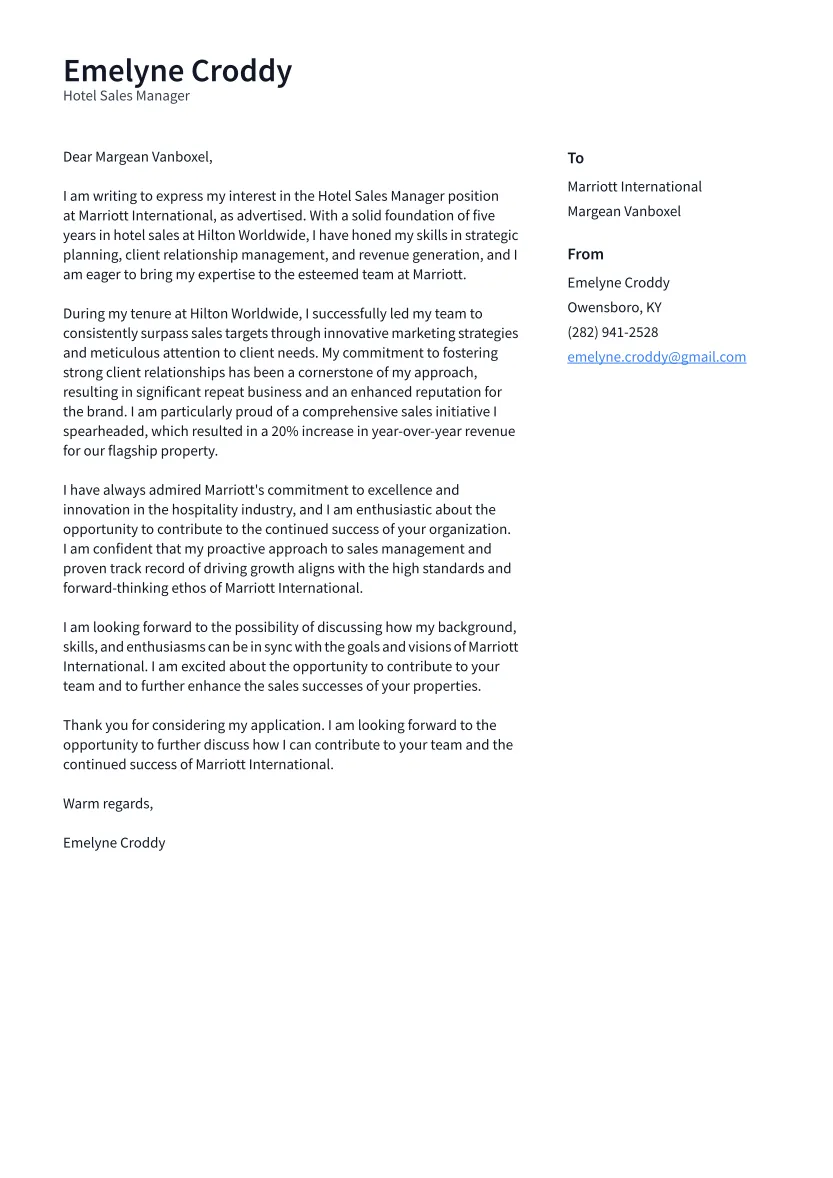Understanding the Importance of a Hotel Sales Manager Cover Letter
A well-crafted cover letter is your first impression and a crucial element when applying for a Hotel Sales Manager position. It’s your opportunity to go beyond the resume, providing a narrative that showcases your personality, skills, and experience. Unlike a resume, which is a factual summary, a cover letter allows you to express your enthusiasm for the role and the specific hotel, making it a powerful tool in securing an interview. Many job seekers underestimate its value, but in a competitive market, a compelling cover letter can set you apart from other candidates and significantly increase your chances of getting hired. It also demonstrates your communication skills and attention to detail, two essential qualities for a sales professional.
Highlighting Your Relevant Skills for the Hotel Industry
When composing your cover letter, make sure to spotlight the skills that are most relevant to the hospitality industry. Focus on skills such as sales strategy development, client relationship management, and negotiation. Detail your experience with revenue management, market analysis, and lead generation. Mention your proficiency in sales software and CRM systems commonly used in hotels. Demonstrate your understanding of the sales cycle, from prospecting to closing deals. Showcasing these skills, along with any certifications or training specific to hotel sales, will position you as a qualified candidate. Ensure your skills directly align with the job description’s requirements.
Demonstrating Sales Achievements and Targets
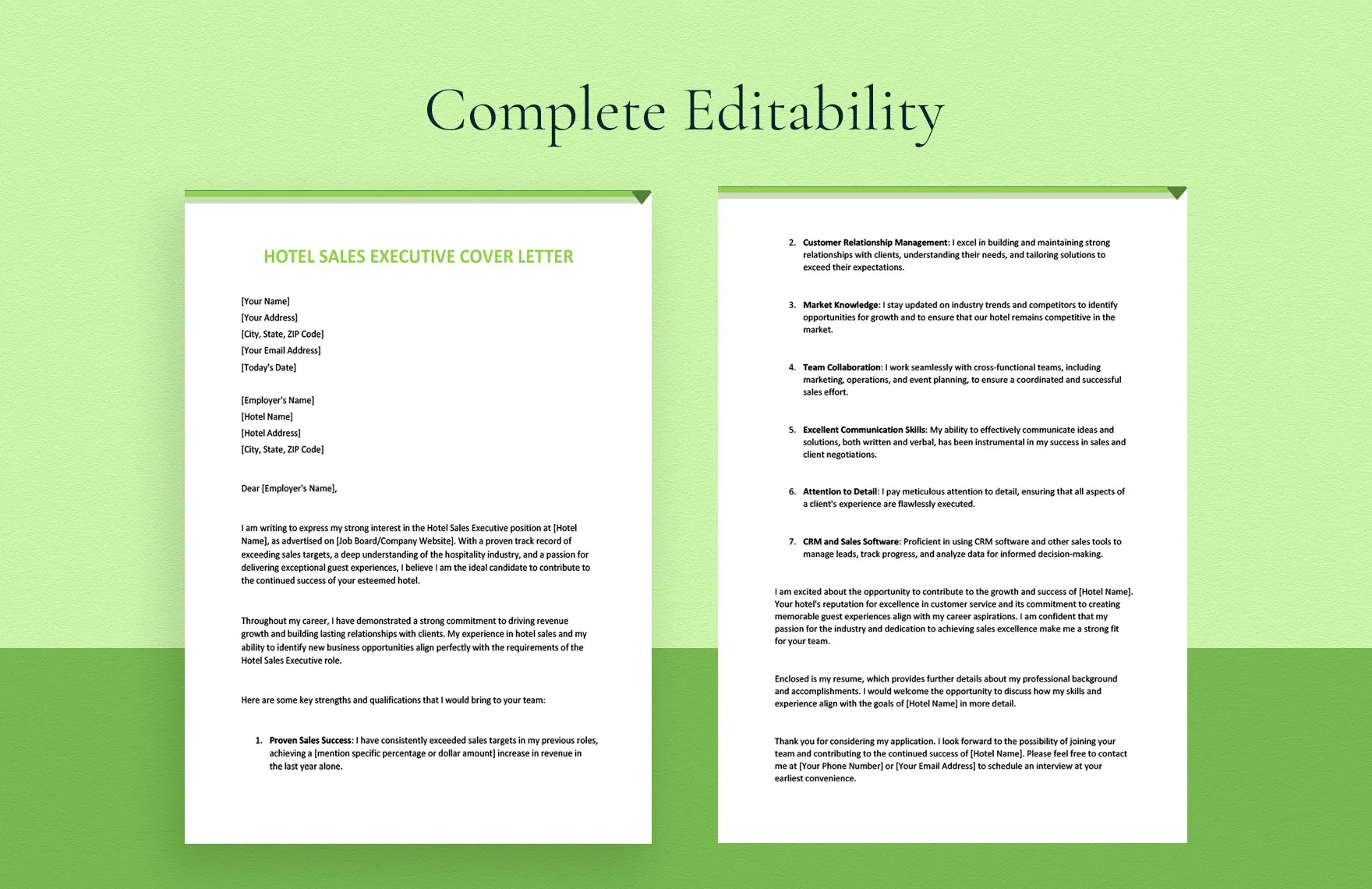
Quantify your achievements to make a strong impact. Instead of simply stating that you increased sales, specify by how much. Include the percentage of revenue growth you achieved, the number of new accounts you secured, or any targets you surpassed. Use numbers to demonstrate your success in previous roles. Did you exceed your sales targets by 15% last quarter? Did you secure a key account that generated $500,000 in revenue annually? Use these metrics to build a compelling case for your candidacy. This data-driven approach shows that you are not only capable but also results-oriented, a highly desirable trait for a Hotel Sales Manager.
Showcasing Your Knowledge of Hotel Operations
Demonstrate a strong understanding of the hotel industry’s operational aspects. This includes knowledge of the various departments such as front desk, housekeeping, and food and beverage. Show how your sales strategies have supported these departments in achieving their goals. Explain how you understand the importance of teamwork and collaboration within a hotel environment. Discuss your experience with group sales, event planning, and conference management. Showing this operational knowledge will showcase your ability to integrate sales strategies seamlessly into the overall hotel operations, thus contributing to the hotel’s profitability and guest satisfaction.
Expressing Your Passion for Hospitality and Sales
Infuse your cover letter with genuine enthusiasm for hospitality and sales. Share what excites you about working in a hotel environment. Discuss your passion for creating memorable guest experiences and building lasting relationships with clients. Express your excitement for the specific hotel you are applying to; research the hotel’s brand, values, and unique selling points. Why do you want to work there? Explain how your personal values align with the hotel’s mission. This demonstrates that you’re not just looking for a job but seeking a long-term career. Passion is contagious, and it can make your cover letter stand out from the rest.
Key Elements to Include in Your Cover Letter
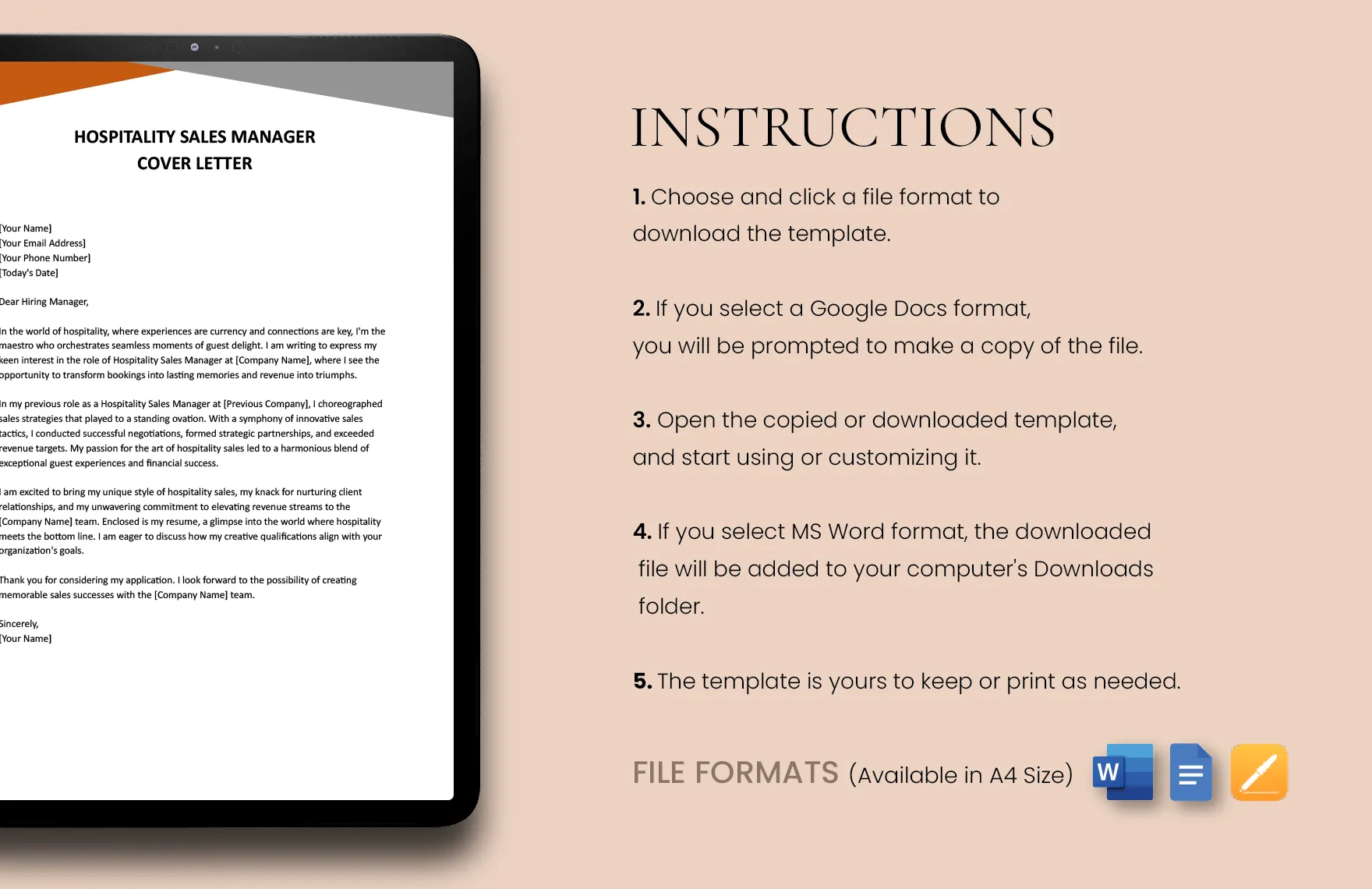
Your cover letter must include several key elements to be effective. First, use a professional format. Include your contact information, the date, and the hiring manager’s name (if known). The body of your letter should consist of a strong opening, detailing your relevant skills and experiences. The middle section should highlight your achievements and how they align with the hotel’s needs. Finish with a compelling closing statement that reiterates your interest and includes a call to action. Remember to proofread your letter carefully for any grammatical errors or typos before submitting.
Opening Statement that Grabs Attention
Begin with an opening that immediately captures the hiring manager’s attention. Avoid generic phrases like “I am writing to express my interest.” Instead, start with a strong statement that highlights your key strengths or a significant achievement. For example, “With a proven track record of exceeding sales targets by over 20% at [Previous Hotel], I am confident I can significantly contribute to [Hotel Name]’s revenue growth.” Alternatively, if you have a unique skill set, lead with that, such as “My expertise in developing and implementing innovative sales strategies, combined with my passion for the hospitality industry, makes me an ideal candidate for the Hotel Sales Manager role at [Hotel Name].” A good opening sets the stage for the rest of your letter.
Highlighting Your Achievements and Results
Detail your accomplishments to provide concrete evidence of your abilities. Use the STAR method (Situation, Task, Action, Result) to structure your examples. First, describe the situation you faced, then the task you were assigned. Outline the actions you took to address the task, and finally, present the results you achieved. For example: “In my role at [Previous Hotel], I was tasked with increasing group bookings. I implemented a new outreach program and improved our client relationship management. The result was a 30% increase in group bookings within six months.” Highlighting your results demonstrates your value to the hotel.
Addressing the Hotel’s Specific Needs
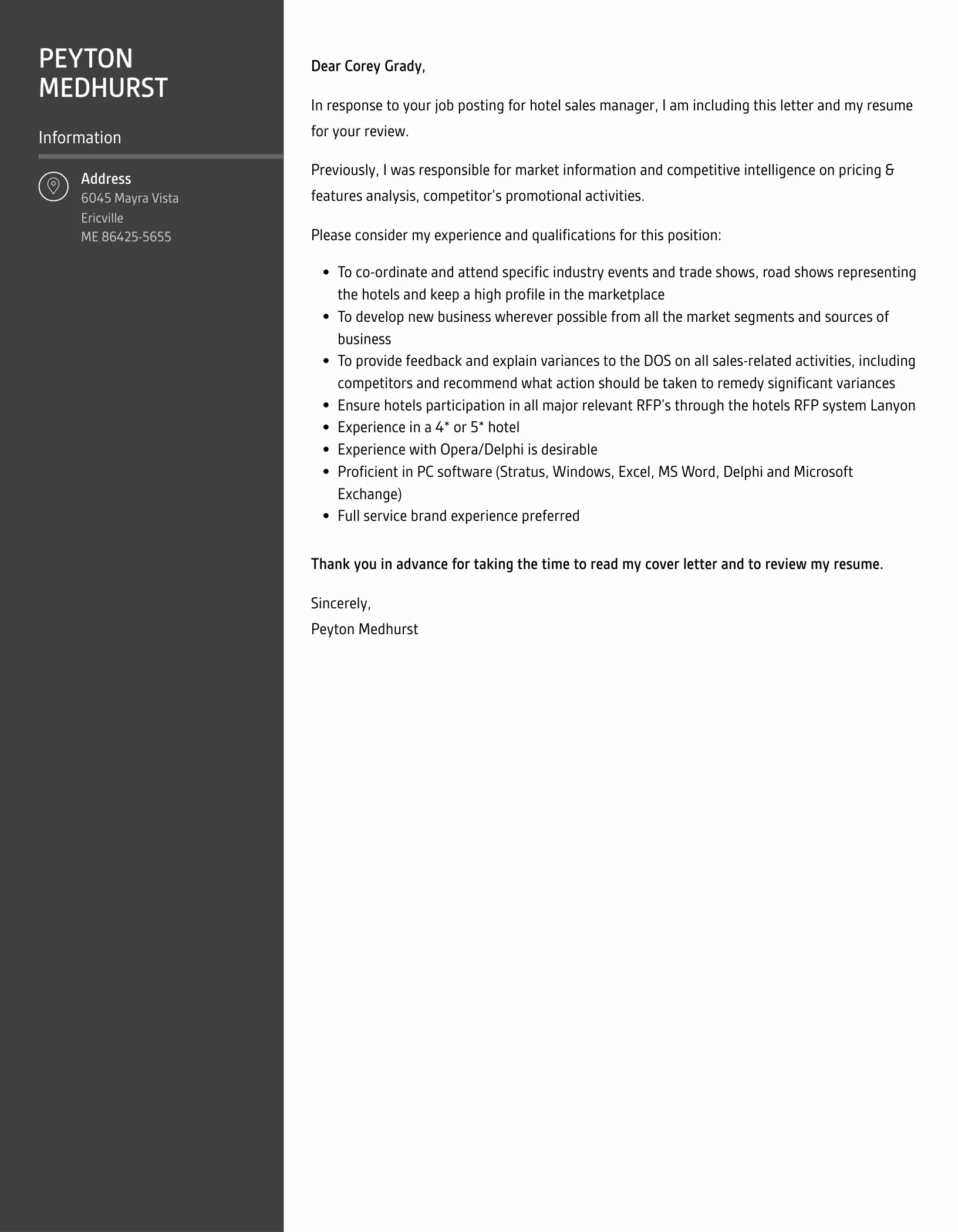
Demonstrate your understanding of the hotel’s specific needs and how your skills can meet those needs. Research the hotel thoroughly before writing your cover letter. Understand its target market, current challenges, and strategic goals. Tailor your letter to address these specific aspects. For example, if the hotel is looking to increase its corporate bookings, highlight your experience in corporate sales. If the hotel is launching a new event space, emphasize your event planning and marketing skills. Show the hiring manager that you have taken the time to understand their needs, proving you are a proactive and thoughtful candidate.
Tailoring Your Cover Letter to the Hotel’s Brand
Customize your cover letter to reflect the hotel’s brand and values. Review the hotel’s website, social media, and any press releases. Understand the tone and messaging they use to communicate their brand. Mirror this in your cover letter. If the hotel emphasizes luxury and elegance, adopt a polished and sophisticated tone. If the hotel focuses on family-friendly experiences, highlight your ability to connect with families. By showing that you understand and respect the hotel’s brand identity, you demonstrate your ability to represent the hotel effectively.
Mentioning Your Understanding of the Local Market
Demonstrate that you understand the local market and the factors that influence hotel sales in the area. If you have previous experience in the region, mention it. If not, research the area’s attractions, demographics, and local businesses. Discuss how you would tailor your sales strategies to the local market. Mention any relevant industry trends or opportunities. Show the hiring manager that you have a strategic understanding of the environment in which the hotel operates. This shows you can hit the ground running and quickly contribute to the hotel’s success.
Professional Closing and Call to Action
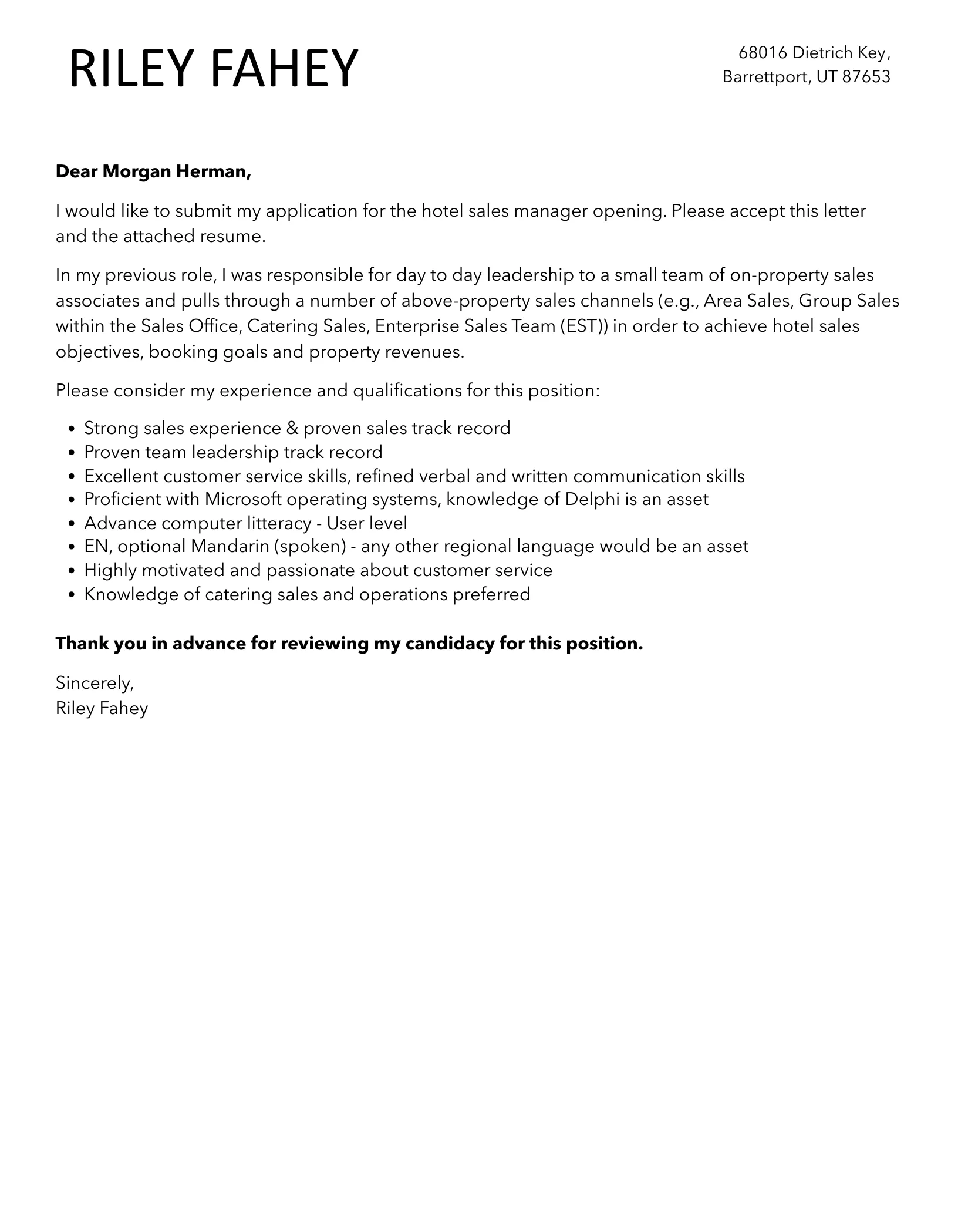
End your cover letter with a strong professional closing and a clear call to action. Reiterate your interest in the position and your enthusiasm for the hotel. Thank the hiring manager for their time and consideration. Include a call to action, such as, “I am eager to discuss how my skills and experience can contribute to [Hotel Name]’s success, and I am available for an interview at your earliest convenience.” Provide your contact information again to ensure it is easy for them to reach you. A clear closing makes it easy for the hiring manager to take the next step.
Formatting Tips for a Professional Cover Letter
Pay close attention to the formatting of your cover letter. A clean, easy-to-read format is critical. Use a standard font such as Times New Roman or Arial, and maintain consistent font sizes throughout the document. Use single-spaced lines with a space between each paragraph. Keep the margins at 1 inch on all sides. Make sure to left-align your text, avoiding justification. Break your text into easily digestible paragraphs. This attention to detail shows that you value professionalism and clarity.
Choosing the Right Font and Layout
The font and layout of your cover letter are essential for readability. Choose a font that is easy on the eyes and widely accepted as professional. Examples include Times New Roman, Arial, or Calibri, with a font size between 11 and 12 points. Maintain a clean layout with clear headings and subheadings to organize your thoughts and make the content easily skimmable. Use ample white space to prevent the page from looking cluttered. A well-formatted cover letter demonstrates professionalism and attention to detail, which is critical in the hospitality industry.
Proofreading and Editing Your Cover Letter
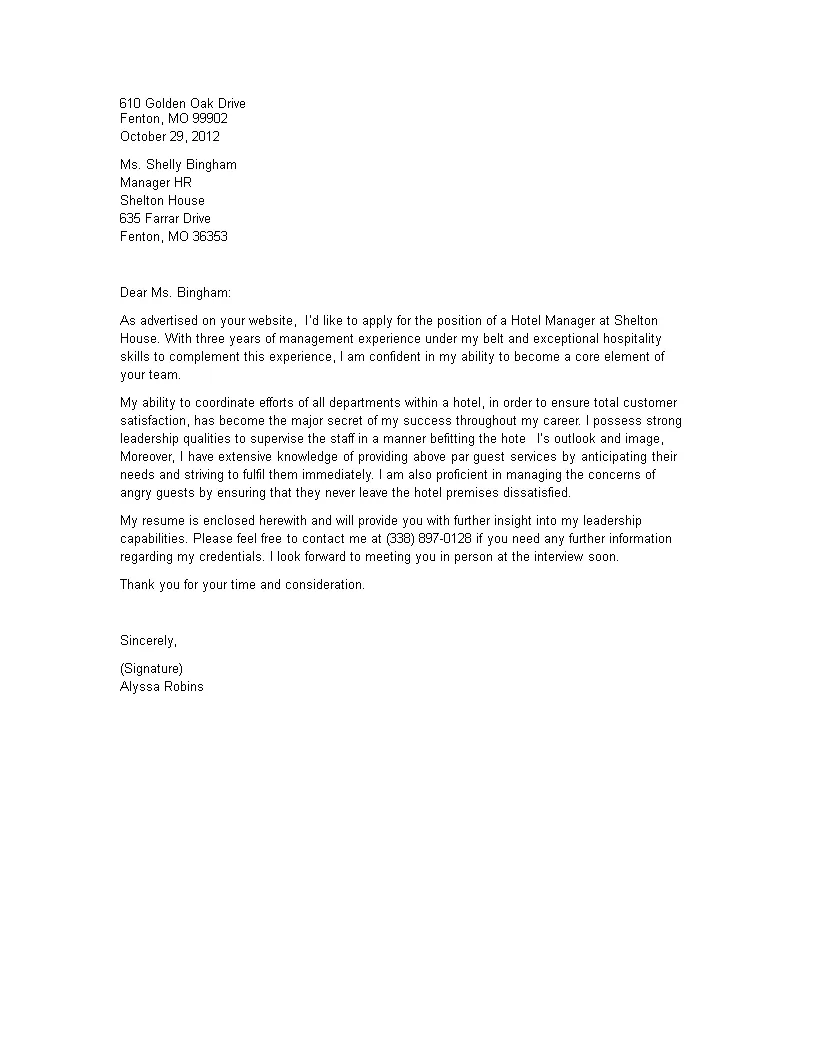
Proofreading and editing are crucial steps to ensure your cover letter is error-free. Always read your cover letter multiple times, looking for any grammatical errors, spelling mistakes, or typos. Use grammar and spell-checking tools, but don’t rely on them completely. Read your cover letter aloud to catch any awkward phrasing or sentence structure. It’s also beneficial to have a friend or colleague proofread your cover letter, as another pair of eyes can often catch mistakes you might miss. A polished cover letter shows attention to detail, which is highly valued in a Hotel Sales Manager.
Avoiding Common Mistakes in Cover Letters
Avoid making these common mistakes to make your cover letter effective. Avoid generic, cookie-cutter letters that can be easily spotted by hiring managers. Focus on the specific requirements of the job and tailor your letter accordingly. Don’t focus too much on yourself. While it’s important to highlight your skills and experiences, make sure to connect them to the hotel’s needs. Highlight how you can contribute to their success. Neglecting to proofread your cover letter is a sure way to make a bad impression.
Generic Language and Lack of Research
Avoid generic language that doesn’t provide specific information. Replace broad statements with details about your accomplishments. Research the hotel and tailor your cover letter to fit their needs and values, showing that you are genuinely interested in the position. Generic letters indicate a lack of effort and can make your application stand out for all the wrong reasons. Show the hiring manager that you have done your homework by highlighting relevant facts, goals and strategies.
Ignoring the Hotel’s Specific Requirements
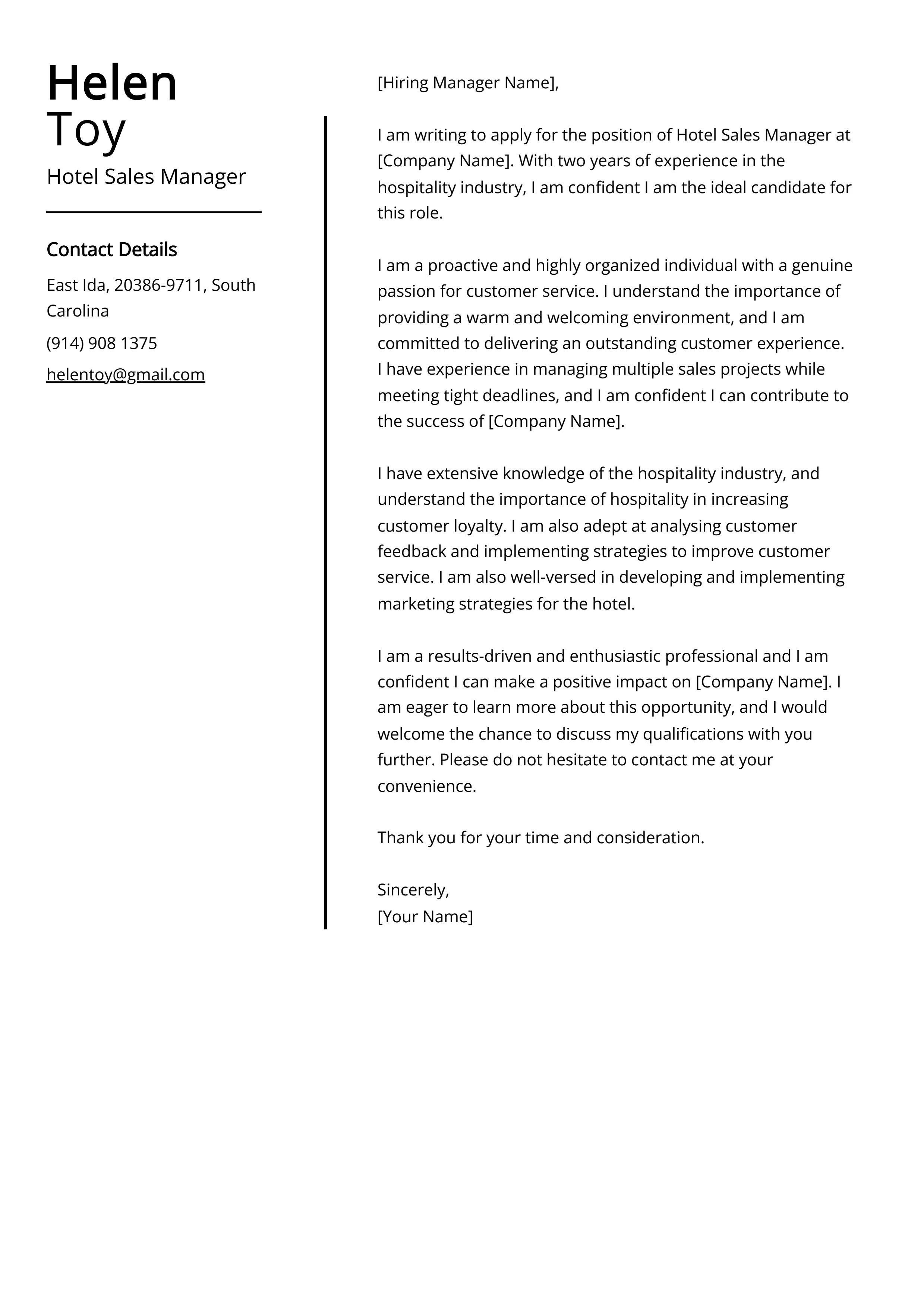
Read the job description carefully and tailor your cover letter to match the hotel’s specific requirements. Highlight the skills, experiences, and qualifications that they are looking for. If the job requires specific experience with group sales, emphasize that aspect of your background. If they value excellent customer service, showcase your experience in building and maintaining positive client relationships. Failing to address their specific needs sends a message that you may not be the right fit for the role.
Focusing Too Much on Yourself
While it’s important to share your experience and skills, don’t focus too much on what you want. Shift the focus to what you can offer the hotel and how you can contribute to their success. Highlight the benefits you bring to the table and explain how your skills can solve their challenges and achieve their goals. Demonstrate your understanding of the hotel’s objectives and how your expertise can help them achieve those objectives. This approach shows that you are not only a skilled professional but also a strategic thinker.
Examples of Strong Cover Letter Phrases
Use strong and impactful phrases throughout your cover letter. Instead of “I have experience,” say, “I have a proven track record of…” or “I am skilled at…” Instead of simply saying you increased sales, quantify your results by mentioning the percentage growth. Use action verbs to describe your accomplishments, such as “achieved,” “managed,” “developed,” or “implemented.” These phrases demonstrate confidence and effectiveness. They help make your cover letter more persuasive and help catch the attention of the recruiter.
Showcasing Sales Skills and Results
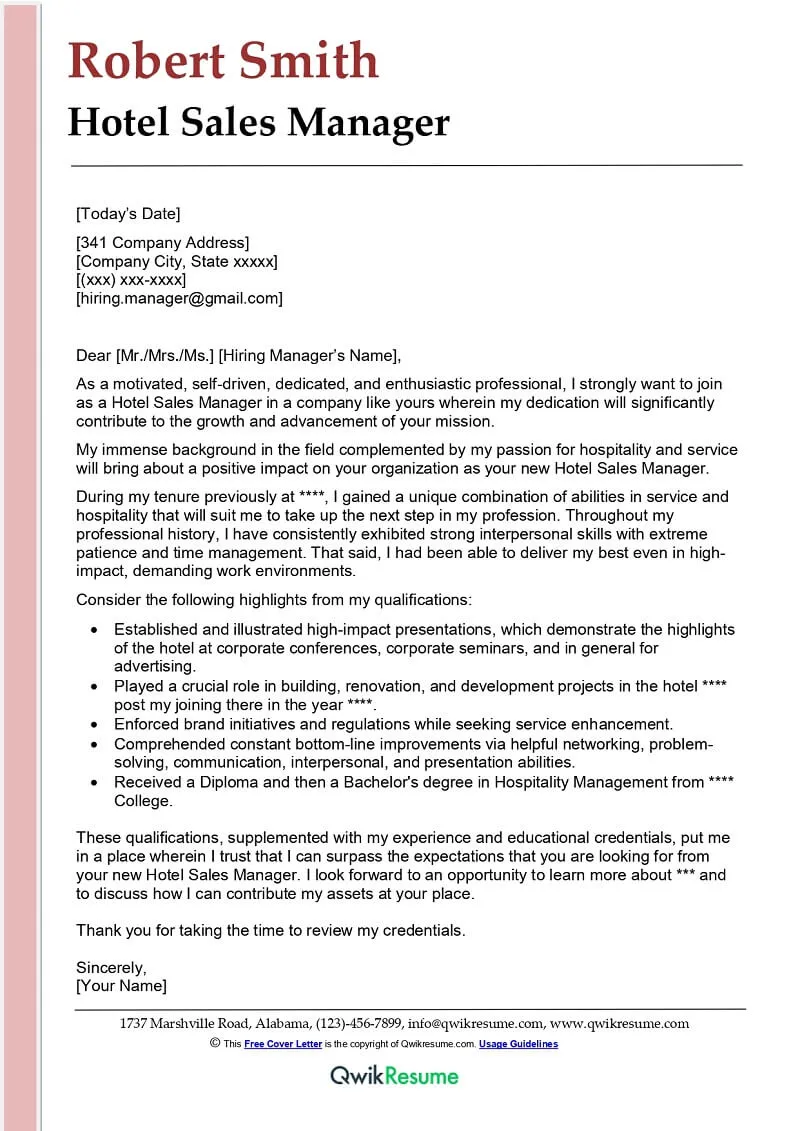
Highlight your sales skills and achievements with compelling phrases. Instead of just listing your responsibilities, quantify your successes. For example, “Increased revenue by 25% within one year by implementing a new sales strategy.” Or, “Successfully secured and managed key accounts, resulting in $1 million in annual revenue.” Showcasing your sales results demonstrates your effectiveness and value to the hotel. Use action verbs to emphasize your active role in achieving these results, like “negotiated,” “persuaded,” and “closed deals.”
Demonstrating Understanding of Hotel Operations
Demonstrate your knowledge of the hotel industry and operations with phrases like, “Proficient in all aspects of hotel operations, including front desk, housekeeping, and food and beverage,” or “Experienced in collaborating with various departments to ensure seamless guest experiences.” Show that you understand how sales strategies interact with other functions of the hotel. For example, “Developed and implemented a sales strategy that increased bookings, directly improving occupancy rates by 10%.” These phrases show that you’re knowledgeable about industry operations and can contribute holistically.
Expressing Enthusiasm and Passion
Express your passion for hospitality and the specific hotel with phrases like, “I am excited by the opportunity to contribute to [Hotel Name]’s commitment to excellence,” or “I am passionate about creating exceptional guest experiences that drive customer loyalty.” Or, “Eager to apply my skills to elevate [Hotel Name]’s reputation.” These phrases add a personal touch to your cover letter and help connect with the hiring manager. By expressing genuine enthusiasm, you make a positive first impression, setting the stage for an interview.
Cover Letter Template for a Hotel Sales Manager
Use a well-structured template to build your cover letter. Start with your contact information, the date, and the hiring manager’s name and title (if known). Write a clear and concise opening paragraph that grabs the reader’s attention. Use the body of the cover letter to highlight your key achievements, skills, and how they align with the hotel’s needs. Close with a professional closing and call to action. This template provides a framework, allowing you to customize your letter effectively and efficiently.
Customizing the Template to Your Experience
Personalize the template based on your experience and the specific requirements of the job. Review your resume and identify the most relevant skills and achievements to highlight. Tailor each section of the template to align with the hotel’s brand, values, and needs. For example, you may want to include a section detailing how you’ve dealt with challenges similar to those the hotel may be facing, or you can adapt examples provided in the template with your experiences.
Review and Finalizing Your Cover Letter
Before submitting your cover letter, conduct a thorough review to ensure it’s polished and error-free. Check for grammatical errors, spelling mistakes, and typos. Ensure the formatting is consistent and professional. Verify that your contact information is correct. Have a friend or colleague review your cover letter for clarity and impact. This final review step is crucial in making a positive impression and increasing your chances of securing an interview. Take the time to refine your letter, and it will boost your chances.
Preparing for the Next Steps
After submitting your cover letter and resume, prepare for the next steps in the hiring process. Be ready for a phone screen or initial interview. Research the hotel further to show you understand the company and the role. Practice answering common interview questions, focusing on examples from your experience. Prepare questions to ask the interviewer. Anticipating these steps shows that you are serious about the opportunity and are eager to take the next steps.
Submitting Your Cover Letter and Resume
When submitting your cover letter and resume, follow the instructions provided by the employer. If the application is online, carefully upload your documents. If you are sending them via email, use a professional subject line and include your name and the job title. Attach your cover letter and resume as separate PDF files. This ensures that your documents are properly formatted and can be viewed correctly. Always double-check everything before submitting to avoid any errors.
Following Up with the Hotel
After submitting your application, follow up with the hotel. Send a polite email to the hiring manager or recruiter a week or two after submitting your application. Reiterate your interest in the position and inquire about the status of your application. This shows that you are proactive and genuinely interested in the role. However, avoid being overly persistent, as it could be perceived negatively. A well-timed and respectful follow-up can keep you at the forefront of their minds.
Tips for a Successful Hotel Sales Manager Interview
Prepare thoroughly for the interview by researching the hotel, understanding the role, and practicing your answers to common interview questions. Dress professionally and arrive on time. During the interview, showcase your sales skills, achievements, and understanding of the hotel industry. Ask insightful questions to demonstrate your interest. Show enthusiasm and passion for the position and the hotel. Prepare for questions about your sales strategies, how you handle difficult situations, and your experience with revenue management. Your preparation will ensure that you make a strong and lasting impression during the interview process.
